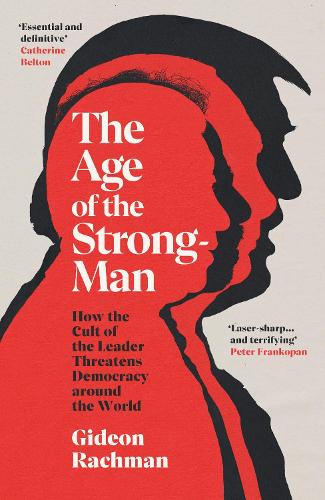
The Age of The Strongman: How the Cult of the Leader Threatens Democracy around the World
(Paperback)
Available Formats
Paperback
Published: 13th June 2023
Paperback
Published: 7th April 2022
Hardback
Published: 7th April 2022
Publishing Details
The Age of The Strongman: How the Cult of the Leader Threatens Democracy around the World
By (Author) Gideon Rachman
Vintage Publishing
The Bodley Head Ltd
7th April 2022
United Kingdom
Classifications
General
Non Fiction
303.34
Physical Properties
Paperback
288
Width 153mm, Height 234mm, Spine 21mm
353g
Description
A sweeping, penetrating and first truly global explanation of the dangerous state of our world, by one of the best-connected, most respected reporters on international politics In The Age of the Strongman, Gideon Rachman finds global coherence in the chaos of the new nationalism, leadership cults and hostility to liberal democracy. We are in a new era- authoritarian leaders have become a central feature of global politics. Since 2000, self-styled strongmen have risen to power in capitals as diverse as Moscow, Beijing, Delhi, Brasilia, Budapest, Ankara, Riyadh and Washington. These leaders are nationalists and social conservatives, with little tolerance for minorities, dissent or the interests of foreigners. At home, they claim to be standing up for ordinary people against globalist elites; abroad, they posture as the embodiments of their nations. And everywhere they go, they encourage a cult of personality. What's more, these leaders are not just operating in authoritarian political systems but have begun to emerge in the heartlands of liberal democracy. While in the West the EU referendum and the election of Donald Trump in 2016 mark a watershed, the new era started at the beginning of the new millennium, when Vladimir Putin took power in Russia. How and why did this new style of strongman leadership arrive How likely is it to lead the world into war or economic collapse And what liberal forces are in place not only to keep these strongmen in check but to reverse the trend With the world in the grip of a global pandemic and on the verge of environmental catastrophe, their actions have consequences not just for their nations but for the whole planet. From Trump, Putin and Bolsonaro to Erdogan, Xi and Modi, Gideon Rachman pays full attention to the strongman phenomenon around the world and uncovers the complex and often surprising interaction between these leaders. In the process, he finds the common themes in our local nightmares and offers a bold new paradigm for understanding our world. Whilst others have tried to understand the emergence of these new leaders individually, The Age of the Strongman provides the first truly global treatment of the new nationalism, underpinned by an exceptional level of access to key actors in this drama- Gideon Rachman has been in the same room with most of these strongmen and reported from their countries over a long journalistic career.
Reviews
Essential reading... Recent events in eastern Europe and beyond make it all the more timely * The Times, *Books of the Year* *
Solidly constructed, engaging and factually sound... A penetrating distillation of the essential ingredients of the strongman * Financial Times *
Timing is everything. Gideon Rachman has got his spot on with The Age Of The Strongman * Daily Mail *
Timely...Rachman... has a journalist's eye for the telling quote combined with a sharp analysis of the factors that enabled them to achieve power and hold on to it * Sunday Times *
This is a brilliant, unsettling portrait of our era -- Rana Mitter, author of Chinas Good War
When it comes to making sense of today's world, Gideon Rachman is in a league of his own. He is sharp, original and unsentimental. -- Ivan Krastev, co-author of The Light that Failed
Essential and definitive... To understand the chilling stakes of the global Great Game defining this century - the battle between autocracies and democracies - you need only turn to Rachman's magisterial and deftly written book -- Catherine Belton, author of Putins People
Author Bio
Gideon Rachman is the chief foreign affairs columnist for the Financial Times. In 2016 he won the Orwell Prize for Journalism and was named Commentator of the Year at the European Press Prize awards. Previously he worked for The Economist for fifteen years, serving as a foreign correspondent in Washington, Bangkok and Brussels.
